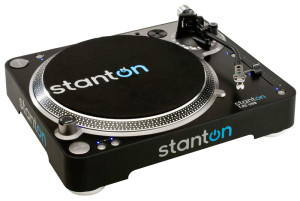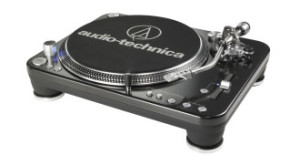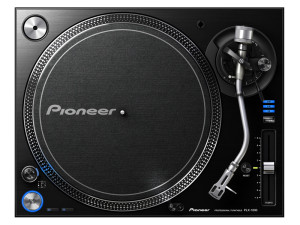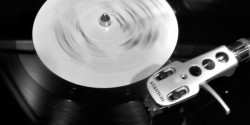I fear I didn’t write last month’s post on good inexpensive turntables soon enough. To the surprise of many, Amazon announced that its top selling item in electronics during the 2015 holiday season was a turntable. Unfortunately, it was a too-cheap, plastic, vinyl-chewing record player that barely costs more than two new LPs. My only solace is that radio stations and new LPFMs won’t be suckered into using this kind of player on air.
Further evidence of vinyl’s exploding popularity is seen in the just-announced revival of the venerated Technics 1200 DJ turntable. But here’s the rub: it costs $4000, well out of reach of too many college, community and low-power stations.
It makes you wonder – there has to be good radio-ready turntables somewhere between the $50 price tag of Amazon’s top seller and the four grand for the new 1200. As luck would have it, there is.
A couple of manufacturers have been making good quality 1200 alternatives for more than a decade, and there is one new entrant that looks to be a truly worthy successor. And they all cost well less than $1000.
So, here’s my guide to inexpensive DJ turntables that are ready for use in your radio studio. Unlike those I recommended for home use, I haven’t used all of these myself. However, those I haven’t either come from brands I have experience with, or are well-reviewed by sources I trust.
All of these turntables are direct-drive. Even though some of these manufacturers call their belt-drive models DJ turntables, I cannot recommend them for studio or real DJ use. That’s because belt-drives don’t tolerate back-cueing well, and that’s necessary to properly cue up a record for near-instantaneous playback on air. They also start up more slowly, making it difficult to get a nice clean start to your track.
Reasonably Priced Radio DJ Turntables:
Audio-Technica AT-LP120 – Typically around $250
I recommended this turntable in my inexpensive turntable post, and it’s good both for home and studio use.
Stanton T92 Direct Drive Turntable – $299
 Stanton makes a wide variety of DJ turntables, several of which have straight tonearms, designated by “STR8” in the model name. These are designed primarily for scratching, therefore most suitable for club DJs that do more than just cue up and beat match records. This kind of straight tonearm is harder on records than traditional “S” shaped ones. Therefore the T92, which has an “S” tonearm is a better choice for radio studios. I haven’t used the T92, but I used the previous model for years in a radio studio and found it to be sturdy and as easy to use as a 1200, with fine sound for broadcast. My impression is that the Stanton is a little more durable and studio-friendly than the Audio-Technica above, but I’ve never really pitted them in a head-to-head comparison.
Stanton makes a wide variety of DJ turntables, several of which have straight tonearms, designated by “STR8” in the model name. These are designed primarily for scratching, therefore most suitable for club DJs that do more than just cue up and beat match records. This kind of straight tonearm is harder on records than traditional “S” shaped ones. Therefore the T92, which has an “S” tonearm is a better choice for radio studios. I haven’t used the T92, but I used the previous model for years in a radio studio and found it to be sturdy and as easy to use as a 1200, with fine sound for broadcast. My impression is that the Stanton is a little more durable and studio-friendly than the Audio-Technica above, but I’ve never really pitted them in a head-to-head comparison.
 Audio Technica AT-LP1240-USB Direct Drive DJ Turntable – $399
Audio Technica AT-LP1240-USB Direct Drive DJ Turntable – $399
This one is bigger, sturdier and about four pounds heavier than either the AT-LP120 or Stanton T92. Important for club-style DJs, its motor has a lot more torque, allowing it to come up to speed faster. In these regards the LP1240 is much closer to a vintage 1200 and probably a better choice for a studio where vinyl gets used often. The USB function is not really useful for radio, since most DJs will want to record what goes out on the air, not just the output of one playback device.
 Pioneer Pro DJ PLX–1000 Direct Drive DJ Turntable – $700–800
Pioneer Pro DJ PLX–1000 Direct Drive DJ Turntable – $700–800
This turntable, newly released in 2014, is probably the closest thing to a true Technics 1200 replacement available today. It’s even heavier and more powerful than the AT-LP1240, and the price–which is nearly double–reflects that. What you should get in return is a turntable that will provide years, if not decades, of trouble-free service, requiring little more than replacing styluses and cartridges on a regular basis. However, since it is a new model, this prediction is only a guess; nobody’s had one long enough to know for sure. Also, I’ve not had my hands on one nor listened to it myself. But Stereophile Magazine’s Herb Reichert has, and he gives it a glowing review not just for DJs but also for sound-obsessed audiophiles.
A few final notes…
Get a real DJ cartridge. This is the little box that holds the stylus (a/k/a “needle”) and is responsible for creating the actual audio signal. You want one made for DJing because they’re designed to tolerate back-cueing and a higher level of overall use and abuse. The Shure M44–7 is a standard for good reasons – it works, it’s sturdy and it sounds good. And at about $50 it’s a relative bargain. It isn’t the very best cartridge for lots of scratching or battle-style playing. But if your DJs are doing that, they should bring their own cartridges because they’ll burn through yours fast. Plan to replace these every one to two years, depending on use.
Also, have plenty of replacement stylii on hand. They are delicate little things that are easy to damage, especially when dozens of different hands are all over them every week. Be prepared to replace them at least twice a year, or whenever they start to look worn (or break). Furthermore, you’ll keep them longer and protect your records if you give them a cleaning every couple of weeks or so.
Finally, you will find other turntables marketed for DJs, sometimes at bargain prices. If they are direct-drive they might hold up for you in a studio environment, but be careful of the adage, “you get what you pay for.” I’ve used DJ turntables under the Gemini and Numark brands and found that the least expensive ones, priced under $200, are lightweight and plasticky, and therefore too easy to knock around.
They might be adequate for previewing records off air or even digitizing tracks, but I’d be hesitant to put them in the air chain. These brands’ higher end turntables may be better, but then you might as well spend the same money on an Audio-Technica, Stanton or Pioneer.



